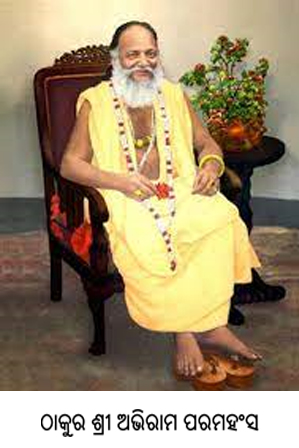Thakur Shree Abhiram Paramahansa
Died :- 27-Nov-1963
Place of Birth :- Karamala village, Puri

The complete manifestation of spirituality, epoch-making litterateur, patriot and freedom fighter Thakur Sri Sri Abhiram Paramahansa Dev was born on January 18, 1904 to father Satyabadi Pattnaik and mother Radhadevi in Karamala village near Brahmagiri of Puri district. It is said that at the time of his birth, their house was illuminated by the bright divine light. The next day after his birth, a Hindoostani sannyasi came to their house and advised his Parents to name the boy as Abhiram. The great Odia seer and poet Mahapurush Achuthananda had predicted his incarnation, along with hints about the location much earlier in the 16th century.
Abhiram was extraordinarily talented since childhood. He more focussed on extra-educatonal activities than on his lessons in the village chatshali. Abhiram was keenly interested in musical instruments such as khajani, pakhauj, mridang, etc. in which he became a master only in his teens. He had also mastered the art of singing bhajan, janan and kirtan with the accompaniment of the musical instruments. It is said he rose in levitation while in meditation. As a teenager, she refused to marry, even though he was forced to do so by her mother Radhadevi. At the end of his studies at the village school, chatshali, he worked as a teacher for a few days. As a result of his constant immersion in the spiritual consciousness, he quit teaching and continued meditation at the age of 19 in the Khandababana ( aforest near Brahmagiri), and with the blessings of Goddess Banadurga, he attained perfection following which he became known everywhere as Thakur Sri Abhiram Paramahansa. He then travelled far and wide in various forests of Odisha for a year and returned to his native village Karmala, where he established an ashram. Influenced by his simple and loving behaviour, sweet language, and divine power, hundreds of men and women became his disciple.
Thakur Sri Abhiram Paramahansa was simultaneously a yogi, a devotee and a poet as well as a patriot. So far, more than 44 spiritual books authored by him have been published. Prominent among them are ‘Bhagavat’, ‘Stuti’, ‘Staba’, ‘Sankirtan’, ‘Gita’, ‘Boli’, ‘Pujapaddhati’, ‘Bhajan Sankalan’ and ‘Sri Chaitanya Tika’. His books such as ‘Bhakti Kallola’, ‘Koili Shiksha’, ‘Gurugita’, ‘Bhajan Neelapadma’, ‘Janan Premasagar’, ‘Amruta Gita’, ‘Bhajanananda Lahari’, ‘Gita Golak’, ‘Bhabakallola’, ‘Durgamadhava Staba’, ‘Adhyatma Mahapurana’ ‘Antaranga Sankirtan O Srichaitanya’, ‘Gajendra Geeta’, ‘Chautisha Manjusha’, ‘Nababoli’, ‘Parvageeta’, ‘Bhajan-Sudhasindhu’ and ‘Srivaishnava Gita’, etc. were highly appreciated and followed by devotees who publicised them far and wide.
The compositions of Paramahansa displayed the unique combination of Utkaliya Vaishnavism and Gaudiya Vaishnavism. The musical appeal of the bhajanas and jananas was highly impactive. His writings were devoted, besides spiritualism, to patriotism and the reform of contemporary society, and, to a remarkable extent, to the freedom of the country from the British rule. In his book Kali Bhagvat, he propagated Gandhiji's policy of non-violence and the Satyagraha. The British government confiscated the book, filed a lawsuit against its author, Thakur Abhiram Paramhansa, arrested him on 26.09.1934 and lodged him in the Chhatrapur Jail. The case was heard in the court of Chhatrapur District Magistrate AFW Dickson between 29.09.1934 and 13.12.1934. He was convicted by the court on 31.12.1934 and was sentenced to one year’s rigorous imprisonment. Fearing public outcry, the Paramahansa was sent to the Berhampur District Jail on 13 December and then on 10.01.1935 he was transferred to Rajmahendri Jail in Andhra Pradesh on the same ground. He was about 30 years old at the time. Shashi Bhushan Rath, the publisher of Kalibhagavat, received a similar sentence. Lawyer Shri Raman Murthy was fighting the case for Abhiram Paramahansa and Lingaraj Panigrahi for Shashi Bhushan. Abhiram’s sentence was eventually relaxed and he was released from prison on 01.11.1935. The great spiritual leader entered his mahasamadhi on 27 November, 1963, leaving behind a rich legacy of spiritualism and patriotism for the posterity.
Books
Anthology of Lyrics Collection
Copyright © 2024 Odia Virtual Academy. All rights reserved Total Visitors- 1
Powered by: Odia Virtual Academy

